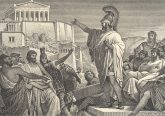 There are two stories in the media this week that touch on the nature of a free society. The first is headline news in the major newspapers and television networks, while the second is largely relegated to the Buzzfeed-esque websites. I’m referring to the terrorist attack on Charlie Hebdo in Paris, where 12 people were killed by alleged Islamic terrorists, and that Mia Khalifa has become the most popular porn star on the internet’s more saucier websites.
There are two stories in the media this week that touch on the nature of a free society. The first is headline news in the major newspapers and television networks, while the second is largely relegated to the Buzzfeed-esque websites. I’m referring to the terrorist attack on Charlie Hebdo in Paris, where 12 people were killed by alleged Islamic terrorists, and that Mia Khalifa has become the most popular porn star on the internet’s more saucier websites.
If people make a connection between the two stories it will probably be Islam.
Charlie Hebdo is well known for courting controversy by offending the religious, especially Muslims. The attack is presumably motivated by their publication of cartoons featuring Mohammed and general mockery. Ms Khalifa, as someone who works in pornography, no doubt offends a wide array of people from anti-pornography feminists to the intuitively prudish. However, she has attracted a great deal of abuse online, including death threats, because she is a Lebanese-American and many people in the Levant take exception to her career on religious grounds.
Yet, Islam is not what’s important in these stories. The more profound connection between the two is vulgarity – and I mean that as a compliment.
The etymological roots of vulgarity simply refer to the “common people” or the unrefined and we need vulgarity to sustain a free society. Neither Charlie Hebdo nor Ms. Khalifa are my cup of tea. Publishing offensive cartoons of religious figures or filming pornography in a hijab is a bit tasteless. However, it is this very quality that has compelled me to applaud them. Perhaps being ensconced in the ivory tower of academia has made my sensibilities too delicate. Perhaps I occasionally need to be jostled out of my dignified stupor by one of the late Cabu’s acerbic cartoons or by Ms Khalifa’s hilarious responses to her Twitter trolls. The vulgar shocks me into interrogating my views. A society without vulgarity runs the risk of becoming intolerably precious or, worse, brutally intolerant. It substitutes truth with, as J.S. Mill said, “dead dogma”. Those who feel that their imagined monopoly on moral truth justifies threatening someone online or murdering those with whom they disagree show the risks of such dogmatism. The troll and the terrorist are separated by degrees not by kind.
Salman Rushdie’s response to the murder of the Charlie Hebdo journalists touches this with an eloquence I can’t match. I disagree with his assertion that religion is a “medieval form of unreason”. It seems rather unfair to blame our medieval ancestors for something that pre-dates them by a few thousand years, and religion doesn’t have a patent on violence and intolerance. However, I must support his claim that all ideas “deserve criticism, satire, and, yes, our fearless disrespect.”
A lot will be written over the coming days that will cast an idealised light on freedom of speech and freedom of expression, but we should be aware these freedoms can and should be shocking. If we do not hold the vulgar to be sacred, then what is sacred will quickly become vulgar.







No Comment